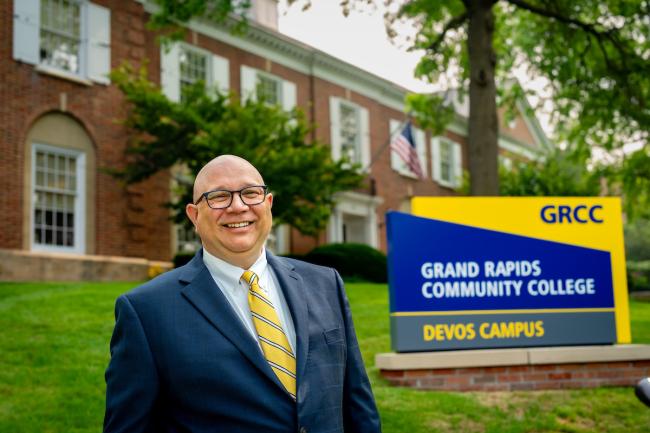Feb. 16, 2024 WASHINGTON, D.C. — Grand Rapids Community College President Charles Lepper was one of more than 30 higher education leaders from 21 states who met at the White House to discuss how community colleges are meeting the ever-growing demand for skilled workers.
Community college presidents and provosts met Feb. 5 with administration officials to share how their institutions are strengthening talent pipelines in growing sectors such as clean energy, biotechnology, advanced manufacturing, semiconductors, and more.
Lepper said GRCC continues working diligently to meet the regional demand for highly trained workers in health care, technology, manufacturing and other industries.
“In the landscape of community colleges, addressing critical issues in workforce development is paramount,” Lepper said. “GRCC remains committed to preparing our students for high-wage, high-demand careers.”
Officials from the Domestic Policy Council, the National Economic Council, the Office of the First Lady, the U.S. Department of Education, and the U.S. Department of Labor heard from community colleges on their successful strategies for recruiting and training a diverse array of students and workers and efforts to create partnerships with K-12 systems, employers, labor unions, local elected leaders, and others.
They discussed ways the federal government might continue supporting their efforts. Common themes included additional federal investment in:
- Short-term training programs with the Federal Pell Grant program
- Recruiting and retaining faculty in high-demand areas
- Incentivizing corporations to support efforts to meet workforce demands
The group also called for more funding for apprenticeship programs.
GRCC already has had tremendous success meeting the employment needs of regional healthcare organizations — and revolutionizing healthcare education — through groundbreaking medical apprenticeships.
Its Medical Assistant Apprenticeship is the first accredited program of its kind in the nation.
Under this pioneering program, students are employed by West Michigan healthcare organizations, engaging in hands-on work three days a week while dedicating two days to immersive classroom learning at GRCC.
Offering full-time health benefits and eliminating tuition fees, the program ensures accessibility and equity for aspiring healthcare professionals. In exchange for this opportunity, graduates commit to a two-year post-graduation employment period with the sponsoring healthcare organization or agree to reimburse the tuition cost.
The Medical Assistant Apprenticeship’s success has encouraged employers to work with GRCC to develop similar apprenticeships for in-demand occupations such as Cardiovascular Technologists, Electroencephalogram Technologists, Surgical Technologists, and Sterile Processing Technicians. The apprenticeship program also is a finalist for a 2024 Bellwether Award in the category of workforce development.
Lepper said he looks forward to working with fellow community college leaders and the White House to meet today’s demand for tomorrow’s jobs.
“Through innovative programs, collaborative partnerships, and a commitment to equity, GRCC will continue paving the way for sustainable solutions in education and workforce development,” Lepper said.

